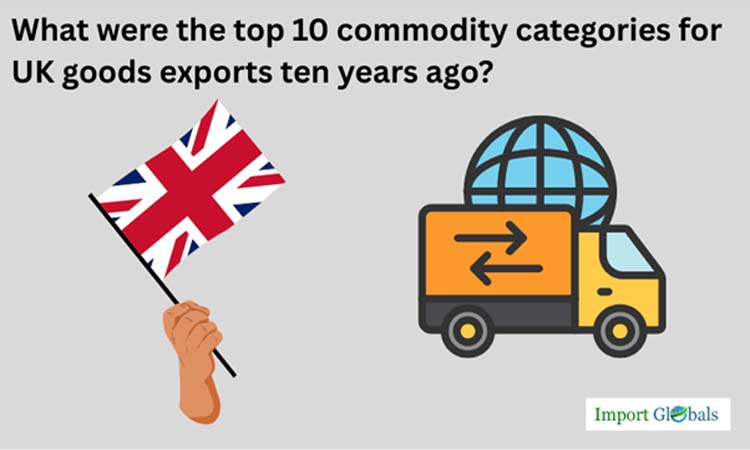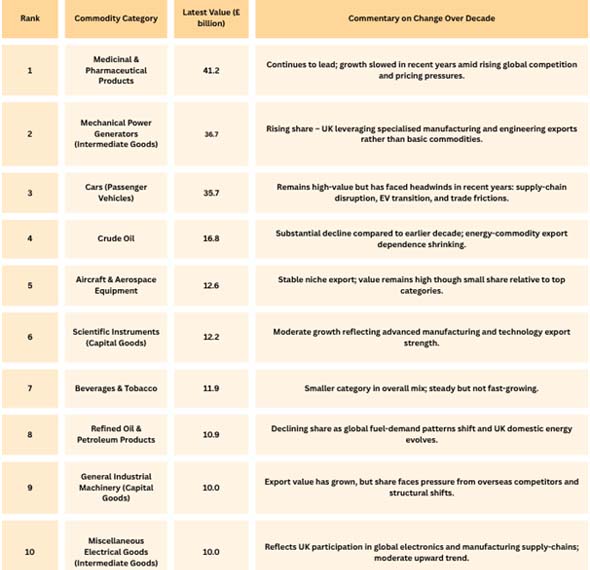
- Nov 12, 2025
What Were the Top 10 Commodity Categories for UK Goods Exports Ten Years Ago?
Over the past ten years, the UK has changed a lot about what it sends to other countries. Changes in the economy's structure, global demand, the need to realign trade after Brexit, challenges with the supply chain, and rising commodity prices have all affected the UK's exports and how it does business.
This blog post speaks about the ten most significant goods the UK sells to other countries, how their prices and shares have changed over the past ten years, and what this means for the economy as a whole. As per UK Import Data by import Globals, even if the actual numbers and yearly fluctuations are varied, the UK's official trade figures illustrate important trends.
TOP 10 COMMODITY CATEGORIES

Big Changes and What Happened in the Last Ten Years
1. Move toward things that are more valuable and are manufactured or used in the middle of the process.
As per UK Export Data by Import Globals, one of the most evident developments is that objects that are made are getting stronger. Things like mechanical power generators, scientific tools, and electrical intermediate goods make it seem like they are getting more valuable. These groupings have gotten bigger, both in terms of total value and, more often than not, in terms of the share of all product exports. Instead of competing on low-value bulk goods, the UK seems to be exploiting its technical and manufacturing skills to its advantage.
2. It's becoming less important to provide things like goods and resources to other countries.
Also, traditional export categories like crude oil and refined petroleum products, which are linked to natural resources and fuel, are less relevant now. As per United Kingdom Import Export Trade Data by Import Globals, these groups are under a lot of stress since the world is using energy differently, there are more producers competing with them, and they are trying to minimize carbon emissions. For example, the UK used to sell a lot of crude oil to foreign countries, but now it sells a lot less than it did ten years ago.
3. The car industry is still important, but it's having a lot of trouble.
As per United Kingdom Import Customs Data by Import Globals, the automobiles category is still near the top of the list, with a value of more than £30 billion. But growth has slowed down in the last ten years and has stopped recently. Problems in the supply chain, more electric vehicles (EVs), more rivalry throughout the world, and trade obstacles (like the UK–EU friction after Brexit) have all made it harder for growth to happen. UK car exporters can't just do what has worked for them in the past; they need to come up with new ideas and change.
4. Pharmaceuticals: Strong but Losing Ground
As per UK import trade analysis by Import Globals, the UK still sells the most precious things, which are medications and drugs. The rate of increase, on the other hand, has slowed down a lot. The UK is still a major player in the pharmaceutical business, but worldwide competition, pricing issues, and regulatory challenges have slowed down what was once a strong pace. This category not rising by double digits in the last few years is a sign.
5. Structural problems are making it tougher for commodities to be exported than services in general.
The essential takeaway is that goods exports have expanded over the last ten years, although not as quickly as services exports. From 2010 to 2019, official numbers show that exports of products expanded by an average of 2.6% per year, while exports of services grew by an average of 3.8% each year. As per United Kingdom Export Data by Import Globals, this suggests that goods are making up a lower part of all UK exports, which is a symptom of changes in the economy. (From an ONS study of the UK's trade volume)
Consequences for UK Exporters and Decision-Makers
These trends have a lot of critical effects on UK firms and the people who make decisions:
Exporters should focus on making specialty goods and those that provide value: More engineering and technology are going into things like generators, instruments, and electrical items that are getting more popular. As per United Kingdom Import Data by Import Globals, companies who pay attention to these things are more likely to see their exports go up.
Change sectors that are losing value: Industries that depend on basic goods and oil exports will see a long-term drop. Companies in these areas should think about branching out, changing how they do business, or moving into fields with more complex products.
As per United Kingdom Import Trade Statistics by Import Globals, the car business needs to modernize. Instead of only depending on current engine and assembly operations, UK-based car exporters need to look ahead to next-generation vehicle platforms, electronics integration, and new markets. This is happening because more and more people are adopting electric cars, companies are getting more automated, and global value chains are becoming more widespread.
As per United Kingdom Import Export Trade Analysis by Import Globals, pharmaceuticals are still performing well, but the competition is getting tougher. UK pharmaceutical businesses need to keep spending money on research and development, make sure their goods obey worldwide laws, and enter new markets to stay ahead of exporters. Also, supply-chain resilience (such for active medicinal components) is becoming more and more important.
Policymakers need to help with trade and manufacturing: As per United Kingdom Import Shipment Data by Import Globals, the government needs to make sure that customs and logistics are quick and easy (especially after Brexit), trade agreements should make things easier, and a lot of money should be put into new manufacturing and innovation.
Balance of goods and services: Balance of goods and Services: As per United Kingdom Import Export Global Data by Import Globals, the UK is trending toward exporting services, which makes it harder for businesses who export commodities. But the area still needs a lot of different exports to make jobs and develop workers' abilities in the industry.
The End
The UK goods-export market has visibly evolved in the last ten years. More and more, exports of high-value manufactured and designed goods are more essential than exports of raw materials and goods. Exports of crude oil and refined petroleum products have diminished in significance, whilst categories such as mechanical power generators, scientific instruments, and electrical goods have gained prominence.
The car and drug sectors are still very important, but they are having issues and need to adapt to new global realities. The UK needs to keep investing in manufacturing, trade facilitation, and new ideas if it wants to keep and increase its global products export footprint. This is because the rate at which products are exported is slower than the rate at which services are exported. UK exporters need to recognize that they can't just compete on price; they also need to compete on quality, technology, and niche markets all over the world.
FAQs
Que. What does "goods exports" mean?
Ans. In UK trade statistics, "goods exports" are things that UK businesses send to other countries or things that come to the UK from other countries. This includes items like cars, machines, energy, goods that have been made, raw materials, and so on.
Que. Why is the UK sending less products to other countries?
Ans. The share of goods in all UK exports has gone down because services exports (such financial, commercial, professional, and digital services) have expanded faster than goods exports. Manufacturing and product exports also have to deal with greater competition from around the world, higher prices for the supply chain, and trade barriers (like after Brexit).
Que. Have any of the top 10 goods been a lot more expensive in the recent few months?
Ans. Yes, groups like mechanical power generators (which are intermediate goods), scientific equipment, and other electrical goods have developed faster and taken up more room. These categories show that the UK is moving toward making more valuable goods and engineering products that are sent to other countries.
Que. What can businesses in the UK do to persuade more consumers to buy their goods?
Ans. Businesses should make items that are more valuable, such high-tech, advanced manufacturing, and engineering goods.
Que. If you notice an increase in demand for specialty things, look into markets that aren't your usual ones.
Ans. Check to discover if their supply chains can withstand problems or constraints on trade.
Que. Keep up with changes in fields like the shift from cars to electric vehicles and the shift from drugs to global supply models.
Ans. Work closely with policy frameworks and tools that make it easier to do business in order to make it easier to export.
Que. Where to get detailed UK export import global trade data?
Ans. Visit www.importglobals.com to know more.
